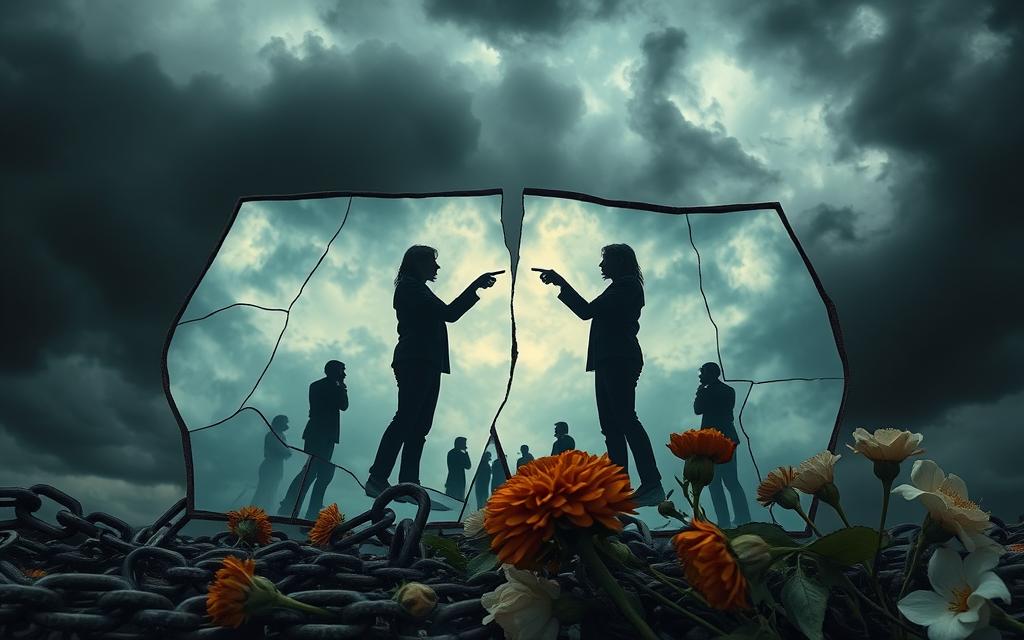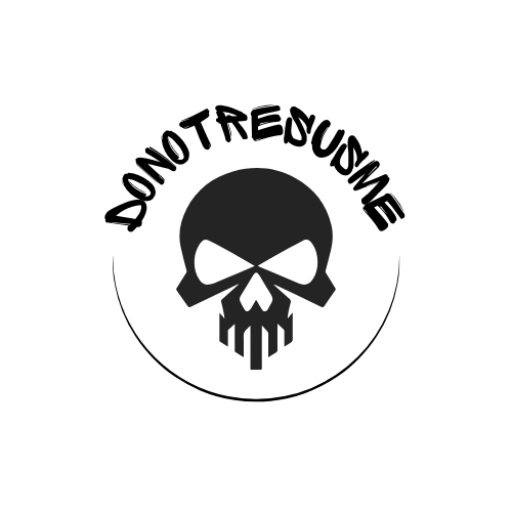Did you know 98% of us tend to blame others more than own up to our mistakes? It’s a surprising fact, right? This habit of passing the buck is deeply rooted in our nature. Let’s explore why we find it easier to blame than to take responsibility.
We’re all good at dodging blame, hiding behind excuses and biases. But, this way of thinking holds us back and hurts our relationships. It’s time to stop blaming and start taking charge of our actions.
This article will look into why we blame others instead of ourselves. We’ll see how constant blaming affects us and how to move past it. Get ready for a journey of self-discovery and personal growth.
The Drama Triangle: Shifting from Victim to Empowerment
The “drama triangle” is a term that describes a harmful way people interact. It shows how people switch between being victims, villains, and heroes. Many get stuck feeling like victims, always blaming others for their issues. This often comes from our early life, where we didn’t have a healthy relationship with our caregivers.
How Childhood Experiences Shape Our Blame Mindset
As kids, we think we’re the reason for our parents’ actions and feelings. This leads to a deep victim mentality. We feel helpless and think others are the cause of our problems. Breaking free from this mindset is key to gaining personal power.
Recognizing What Doesn’t Belong to You
Moving past blame starts with realizing our parents’ problems weren’t ours to fix. Their emotional issues and trauma weren’t our burden. Understanding this is a big step towards letting go of self-blame and emotional responsibility that has held us back.
“The truth is, unless you let go, unless you forgive yourself, unless you forgive the situation, unless you realize that the situation is over, you cannot move forward.” – Steve Maraboli
By grasping the roots of our victim mentality and how childhood trauma shaped our views, we can start to take back our power. This leads us towards a more empowered way of thinking.
The Burden of Blame: Self-Blame and Blaming Others
The blame game comes in two forms: self-blame and blaming others. Both can harm us, keeping us stuck in shame and stopping our growth. Self-blame traps us in a cycle of shame, making it hard to accept ourselves. Blaming others makes us feel like victims, stopping us from healing and taking care of our feelings.
The Harm of Self-Blame and Its Shame Cycle
Self-blame makes us think we’re flawed and to blame for all bad things. This starts a shame cycle hard to escape. We feel unworthy and don’t deserve happiness, leading to no self-compassion and fear of trying new things.
The Trap of Blaming Others and Staying Stuck
Blaming others might feel relieving at first but takes away our power. It stops us from changing and growing. This way of thinking can be easy but is bad for us in the long run.
To escape blame, we must own our feelings and actions. This change helps us become more aware, resilient, and able to live the life we want.
“The ultimate lesson all of us have to learn is unconditional love, which includes not only others but ourselves as well.” – Elisabeth Kübler-Ross
Taking Responsibility: A Powerful Act of Grace
Life can make us want to blame others easily. But, true growth comes from taking responsibility. Moving from blame to accountability helps us grow in self-compassion and forgiveness.
Self-compassion is crucial for this change. We should treat ourselves kindly, just as we would a close friend. This creates a safe space for accountability to grow. Blaming ourselves only keeps us stuck in shame and stops us from moving forward.
Shifting from Blame to Responsibility
Changing from blaming to taking responsibility is hard but freeing. It means dropping the victim mindset and seeing our power to change our lives. We don’t excuse bad behavior, but we see our power to respond and make positive changes.
Forgiveness is key in this change. Letting go of anger and forgiving ourselves and others frees us from blame. This opens the door to better, more fulfilling relationships.
“The ability to take responsibility is the ability to take control.” – Stephen R. Covey
With self-compassion and forgiveness, we see how powerful taking responsibility is. This brave act frees us from blame, gives us back our power, and starts a journey of growth and empowerment.
Practical Techniques for Letting Go of Blame
Letting go of blame and taking personal responsibility is a powerful step. It’s a journey that can be tough but rewarding. We can use simple techniques every day to help us change. Tools like EFT tapping, energy healing, journaling, and sage smudging can help us. They aid in releasing blame and improving how we handle our emotions.
Daily Tapping and Energy Healing Practices
Tapping, also known as Emotional Freedom Techniques (EFT), is a great way to release blame. It involves tapping on certain points while saying affirmations. This helps us deal with the emotional side of blame. Doing this can clear our energy and help us move past old stories towards a new mindset.
Journaling and Sage Smudging for Emotional Release
Journaling is another powerful tool for dealing with emotions and blame. Writing down our thoughts and feelings helps us understand ourselves better. It can help us see patterns and release the emotional weight of blame. Adding sage smudging to this can enhance the process. This Native American ritual uses sage smoke to cleanse our space and our energy. It creates a safe space for us to work on letting go of blame.
By using these techniques every day, we can slowly release the weight of blame. This leads to a more empowered and responsible way of living.
Why do we blame more often than taking responsibility?
Have you ever noticed how often we blame others instead of owning up to our mistakes? This habit is quite interesting. It’s rooted in our minds, showing us how we prefer to blame rather than take responsibility. Let’s explore why this happens.
The Psychology Behind Blaming Others
Our tendency to blame others comes from the self-serving bias. This bias makes us take credit for our wins but blame others for our losses. It’s a way to keep our ego safe and our self-image positive. Admitting mistakes can make us feel weak and less in control.
Blaming others is easier and lets us dodge the hard work of being accountable. It’s a way to avoid taking responsibility and instead, see ourselves as victims. Sometimes, deep down, we blame to feel better about ourselves or to seem superior.
“The one thing that doesn’t abide by majority rule is a person’s conscience.” – Harper Lee
Knowing why we blame can help us change and become more responsible. By understanding these psychological drivers, we can start to see things differently. This awareness can lead us to take responsibility and move past the blame game.
The Consequences of Chronic Blaming

Blaming others for our problems can really hurt us. It stops us from growing and takes away our power. This cycle makes us feel stuck, unable to own up to our actions.
Stunted Personal Growth and Loss of Power
Not taking responsibility for our problems means we miss out on learning from them. The blame game keeps us in denial. This stops us from growing emotionally and intellectually.
We become powerless, unable to change our lives for the better.
Damaged Relationships and Lack of Empathy
Blaming others hurts our relationships. It breaks trust and empathy. Our friends and family feel attacked, making it hard to solve problems together.
Without taking responsibility, we can’t grow emotionally. This makes building strong relationships tough.
The blame game has big, deep effects. Taking responsibility helps us grow, become empowered, and build real relationships. It’s hard, but it leads to a better life.
“The blame game keeps us stuck in a state of denial, preventing us from developing the self-awareness and emotional intelligence needed to navigate life’s complexities.”
Building Self-Esteem and Emotional Resilience
To break free from the blame cycle, we must focus on self-esteem and emotional resilience. This means accepting our own flaws and taking personal accountability for our actions and feelings. Instead of beating ourselves up over mistakes, we can be kind to ourselves and see setbacks as chances to grow.
Building a strong sense of self-acceptance helps us not need others’ approval so much. It also makes us less upset when we can’t blame others. This inner strength lets us take charge of our lives bravely and gracefully.
Accepting Imperfection and Embracing Accountability
Letting go of the need to be perfect is key to building emotional resilience. We all err, and that’s fine. What’s important is how we deal with them. Instead of self-criticism, we can admit our mistakes, learn from them, and move on with personal accountability.
- Embrace your imperfections as part of your unique identity.
- Cultivate self-compassion and treat yourself with kindness.
- Take responsibility for your actions and emotions, without blaming others.
- Use setbacks as opportunities for personal growth and development.
“The greatest weapon against stress is our ability to choose one thought over another.” – William James
By accepting our flaws and taking personal accountability, we lay the groundwork for strong self-esteem and emotional resilience. This lets us face life’s ups and downs with grace and confidence, rather than blaming others.
This article offers insights to help you gain self-awareness and strength to own your life, even when it’s tough. By facing reality and being true to yourself, you can discover a new level of emotional resilience and self-acceptance.
The Power of Responsibility in Relationships

Embracing responsibility changes us and our relationships. It moves us from blame to accountability. This shift helps us build trust and communicate better.
By being accountable, we set a good example. This encourages others to be more real and supportive with us.
Healthy Communication and Trust-Building
Often, we blame others for our problems. But taking responsibility for our feelings helps us communicate better. We can share our thoughts clearly and listen well.
This leads to trust, which is key for strong relationships.
Modeling Accountability for Positive Influence
When we take responsibility, we show its power. People around us see the change and want to do the same. This spreads accountability and builds stronger connections.
“The most important thing in communication is hearing what isn’t said.” – Peter Drucker
Responsibility in relationships leads to deeper understanding and stronger bonds. It’s a kind act that positively affects us and those we care about.
Seeking Professional Support
Changing from blaming others to taking personal responsibility can be tough. But, you don’t have to face it alone. A therapist or life coach can greatly help in overcoming the habit of blaming others.
The Benefits of Therapy and Coaching
A professional can help us find out why we blame others. They look at our past, like childhood and past traumas. Through therapy, we can deal with these issues in a healthy way. This leads to being kinder to ourselves and stopping the shame that makes us blame.
A life coach can teach us new skills and habits to move from feeling like a victim to being empowered. They offer support, helpful advice, and ways to handle our feelings and own our choices.
Repairing Relationships and Learning New Behaviors
With help from a professional therapist or coach, we can fix broken relationships and start acting more responsibly. This might mean getting better at talking to people, forgiving others, or finding healthy ways to deal with stress and disagreements.
Professional support is key in the hard but rewarding journey of taking full responsibility for our lives and relationships. By tackling the deep reasons behind our blaming, we open up to more self-awareness, understanding others, and growing personally.
“The path of personal responsibility is not an easy one, but it is the surest way to reclaim our power and live with authentic purpose.” – [Author Name]
Letting Go of the Blame Story
The key to breaking free from the blame game is to let go of the stories we tell ourselves about our past. These blame narratives grow, adding more blame and victimhood with each retelling. We need to look at these stories objectively and choose a new perspective. This new view empowers us to take control of our lives.
Changing our mindset is hard but vital for personal growth and a better life. By letting go of blame, we stop looking outside for someone to blame. We focus on ourselves, acknowledging our part in situations and using our power of responsibility.
The Snowball Effect of Blame Narratives
Sticking to our blame stories traps us in a cycle. Every time we tell the story, we add more details and stress our victimhood. This makes it hard to see things clearly and take action.
The more we tell the blame story, the deeper it gets in our minds. It makes us feel powerless and like we’re controlled by things outside us. To break this cycle, we must decide to stop and see things differently.
Embracing a New Perspective
Seeing our past in a new perspective can free and empower us. Instead of dwelling on what went wrong and who’s to blame, we focus on what we’ve learned and grown. This change lets us move past blame and use our resilience and personal growth.
Letting go of blame means we can be kinder to ourselves, forgive, and understand ourselves and others better. This new view can lead to better relationships, more emotional smarts, and a stronger sense of purpose and happiness.
“The most powerful thing you can do is forgive. Forgiveness is not about the other person, it’s about you. It’s about your own freedom and your own growth.”
Conclusion
We often blame instead of taking responsibility, a habit rooted in our childhood and our minds’ biases. Yet, moving from blame to accountability is key to personal growth and strong relationships.
By understanding this pattern and choosing responsibility, we open doors to healing, self-esteem, and emotional strength. Techniques like daily tapping, energy healing, and journaling help us drop blame and embrace empowerment.
Getting help from professionals, like therapists or coaches, can greatly aid in fixing relationships and learning new ways to be. This path is tough, but the benefits of taking responsibility are huge. Let’s leave the blame behind and embrace personal accountability. This shift opens up endless possibilities for growth and happiness.

